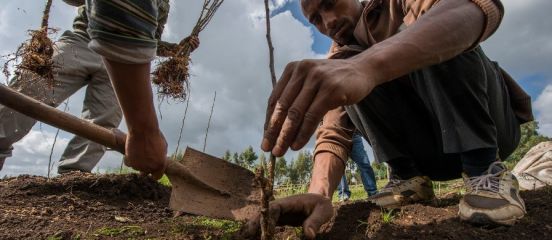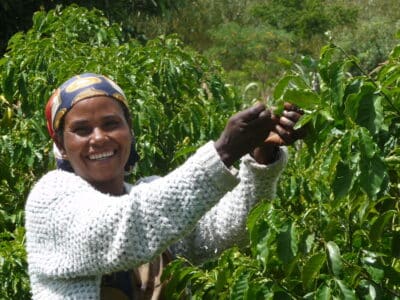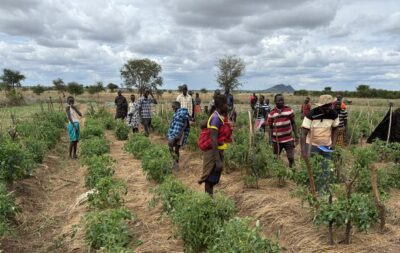News
6 December 2016
Re-greening the Bale lowlands, one tree at a time

With heightened global awareness of the dangers of deforestation and the resulting water stress that it causes, Farm Africa has implemented a pilot scheme encouraging farmers to grow trees on their land. The aim is to show how it is possible to combine earning a decent living from the land with improved environmental management.
The woodlot pilot directly involves local farmers in Ethiopia’s Bale Eco-region in the fight to arrest soil erosion and the steady depletion of natural forest, both of which are intimately linked and cause water access problems in the lowlands.
The loss of forest from the rugged landscape in Bale has dramatically reduced the ability of the soil to retain water, caused increased runoff and contributed to the growth of large gulleys across the landscape. Poor quality soil and lack of water mean poor yields year on year and force farmers to move on to clear more forest areas for farming, which increases the problem further.
 Mohammed Hussein Arog is the first farmer in his kebele (local area) to have planted a woodlot on his land using Eucalyptus seedlings from a nearby community tree nursery that was set up with support from Farm Africa.
Mohammed Hussein Arog is the first farmer in his kebele (local area) to have planted a woodlot on his land using Eucalyptus seedlings from a nearby community tree nursery that was set up with support from Farm Africa.
The aim is to ensure farmers have a steady and alternative supply of wood by planting their own trees in woodlots, which removes the need to cut trees from the endangered natural forest. The trees they plant will supply wood for fuel or for building their homes and farm buildings, and the excess can be sold for use in the construction industry to supplement their household income.
Mohammed has made his own calculations on the advantages of planting trees and establishing a woodlot on part of the land he used to grow maize, anticipating that the long-term gains look like a good investment:
“I used to grow maize in this field. I am looking at the comparative advantages of growing Eucalyptus trees: from this plot of land I would earn less money from maize. After three years I think I will be able to earn much more from the eucalyptus trees than I am earning currently from growing maize. I have other farmland that will sustain me in the meantime. I already left this land anyway because it had become less fertile for maize.”
The economic arguments made by the farmer are powerful ones but a drive to better manage the area’s natural resources was also a compelling reason for Mohammed to take part in the pilot.
He continues: “Beside the money I am looking to earn from the Eucalyptus, I’m also doing this for environmental reasons.”
Mohammed was happy to sign a conservation covenant, promising not to cut down trees in the natural forest, as well as committing to contribute positively to environmental conservation. The benefits are felt by Mohammed, who will be earning a higher income from his trees, and by surrounding communities who will be better protected against the impacts of water runoff and soil erosion in the highlands. The global community also will benefit from the positive effects on the environment with increased long-term storage of carbon in the forest.
 Eucalyptus trees were selected for the woodlot pilot because they grow quickly, enabling farmers to sell the timber in just three years. Also, when the mature tree is harvested, sprouts grow from the stump and a new tree will grow. This means that the farmers have a sustainable business with no need to go back to the community tree nursery for more seedlings.
Eucalyptus trees were selected for the woodlot pilot because they grow quickly, enabling farmers to sell the timber in just three years. Also, when the mature tree is harvested, sprouts grow from the stump and a new tree will grow. This means that the farmers have a sustainable business with no need to go back to the community tree nursery for more seedlings.
About 50 farmers are already involved in the woodlot development pilot in Bale, while similar work in central Ethiopia, working with 200 farmers, has established 42 hectares of woodlots. Farm Africa hopes to persuade many other farmers in the area and beyond to set aside land to grow trees. These are small but important steps in the fight against Africa’s deforestation and enhance the role of community in alleviating the effects of climate change.
The woodlot pilot is part of Farm Africa’s ‘Sustainable livelihoods through ecosystem conservation’ project that is funded by the European Union’s Supporting Horn of Africa Resilience (SHARE) initiative.




